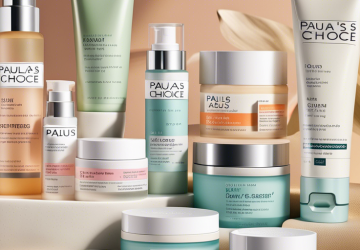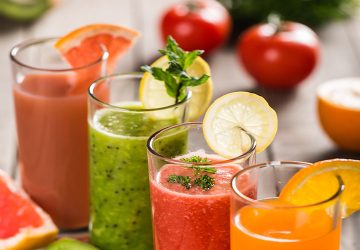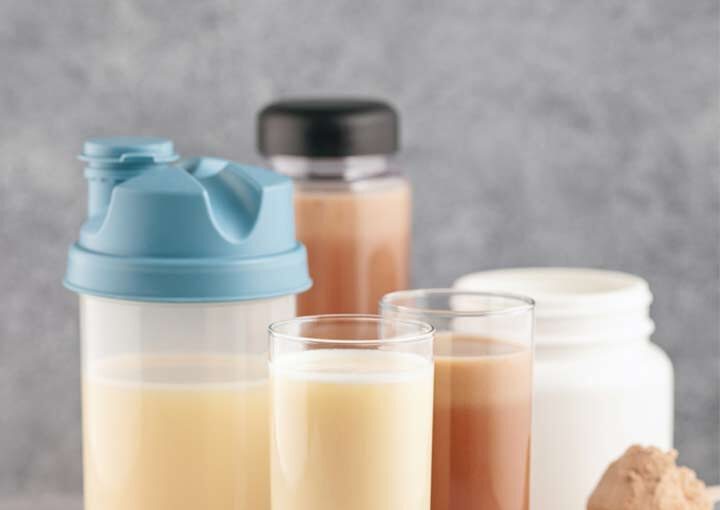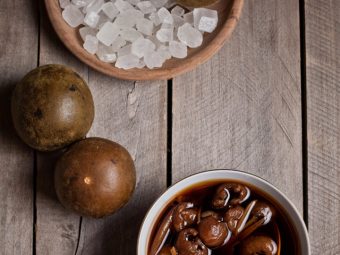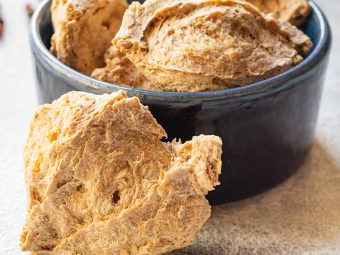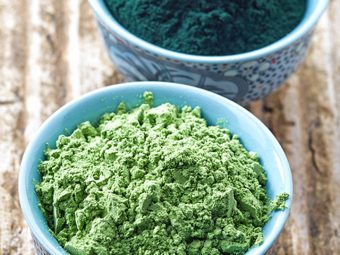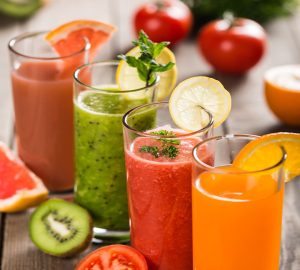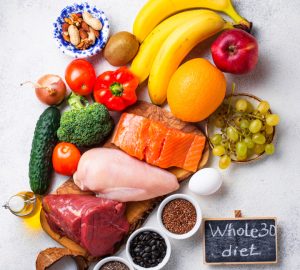[ad_1]
Anyone interested in fitness will have definitely come across the soy protein vs. whey protein debate. Soy and whey proteins are the two common supplements fitness enthusiasts usually research on during their journey. Though similar in their nutritional composition, the two are different in their functions, digestibility, and benefits.
What makes them different from each other? Which one should you choose for your health? These are important questions that need answers. In this article, you will learn about the major differences between the two protein variants, their pros and cons, and which of the two is better for you. Keep reading.
What Is Soy Protein?
Soy protein is a plant-based protein made from soya beans. The soya beans are ground into a fine meal before its fiber, carbohydrate, and fat are removed. The manufacturers then grind and process the remaining powder into soy flour, soy protein concentrate, or soy protein isolate, which contain all the nine essential amino acids, glutamine, and arginine. Soy protein isolate is the most refined of all, as it contains about 88.3 g protein for every 100 gm serving (1). Increasing soy protein intake may help lower total cholesterol levels, low-density lipoprotein, and triglyceridesi XA type of fat produced in the body and stored in the blood to provide energy in between meals. . It also can relieve menopausal hot flashesi XSwearing and a sudden intense warmth spreading over the neck, face, and chest that occurs mainly during the menopausal stage. , maintain bone density, control obesity, and decrease fractures in postmenopausal women (2), (3).
Related: 15 Homemade Protein Shakes – Healthy & Tasty 5-Min Recipes
What Is Whey Protein?
Whey protein is an animal-based protein obtained from cow’s milk. It is formed as a byproduct of the cheesemaking process. When cheese is made from cow’s milk, the casein gets separated and leaves behind whey protein and water as byproducts. The water is then processed to make concentrated whey isolate, which has a high percentage of pure protein at 58.1 g per 100 gm serving. Carbohydrates, fats, and cholesterol are present, though only in limited amounts (4). Whey protein supplementation helps improve body weight and total fat mass and reduces the risk of cardiovascular disease in those dealing with obesity (5).
Did You Know?
Legend has it that, during the Middle Ages, a medical tonic made from whey protein was used to treat ailing patients.
Most people use both these proteins to control obesity and improve body composition. However, they are not the same. Apart from their sources, there are other differences that make these two variants unique in their own right.
Differences Between Soy And Whey Protein
Soy Protein Vs. Whey Protein: Taste And Texture
Soy protein drinks are grainier and have a stronger nutty flavor than those made with whey protein. Whey protein drinks have a creamier and smoother texture with a mildly nutty flavor. However, the taste and texture also depend on the different brands and the flavors they use.
Stylecraze says
You can buy unflavored versions of protein and create your own taste by adding fruits and nuts of your choice.
Soy Protein Vs. Whey Protein: Biological Values
Biological values highlight how efficiently the body utilizes the protein consumed through the diet. Whey, at 104, scores higher in this regard; while soy scores 74 (6). This score suggests that the amount of protein absorbed from whey protein is more than that from soy protein.
Soy Protein Vs. Whey Protein: Net Protein Utilization
Net protein utilization also measures the value or usefulness of specific proteins in a diet. It is the ratio of amino acids converted to protein to the mass of amino acids supplied. Here, too, whey scores higher at 92 while soy protein is at 61 (6).
Soy Protein Vs. Whey Protein: Amino Acids
Soy protein and whey protein are complete proteins that contain all essential amino acids. However, they are not distributed equally. While soy protein is high in histidine and phenylamine, whey protein has the highest percentage of leucine, isoleucine, methionine, threonine, and lysine (7).
| Essential Amino Acids | Soy (per 100 g) | Whey (per 100 g) |
| Threonine
Methionine Phenylalanine Histidine Lysine Valine Isoleucine Leucine Total EAA |
2.3
0.3 3.2 1.5 3.4 2.2 1.9 5.0 19.9 |
5.4
1.8 2.5 1.4 7.1 3.5 3.8 8.6 34.1 |
| Non-Essential Amino Acids | Soy (per 100 g) | Whey (per 100 g) |
| Serine
Glycine Glutamic acid Proline Cysteine Alanine Tyrosine Arginine Total NEAA |
3.4
2.7 12.4 3.3 0.2 2.8 2.2 4.8 31.9 |
4.0
1.5 15.5 4.8 0.8 4.2 2.4 1.7 34.9 |
While these amino acids help improve several health parameters, if not used properly, they may also cause adverse effects. Read on to find out more.
Pros And Cons Of Soy Protein And Whey Protein
Soy Protein
Pros
- Is a complete, vegan protein source.
- A good source of fiber, iron, calcium, zinc, and B vitamins.
- Isoflavonesi XPlant-based compounds found mainly in soy products that may protect against age-related health issues. in soy products bind to estrogen receptors to help lower cholesterol levels (3).
- Dietary intervention of soy protein improves blood glucose levels, insulin resistance, and obesity (8).
- Genisteini XA compound developed from legumes that helps inhibit estrogen and reduce blood glucose levels. in soy may help reduce the risk of cancer.
- Its phytoestrogensi XEstrogen-like compounds present naturally in plants that have a similar chemical structure to the body’s estrogens. help protect women from bone loss and heart disease.
Cons
- Trypsin inhibitorsi XA protein and type of inhibitor that controls the activation and reaction of the enzyme trypsin and other proteins. in soy may reduce protein digestibility (9).
- Lectins and lysinoalanine formed during the processing of soybeans may cause allergic reactions (10).
- Isoflavones and phytoestrogens in soy products may result in lower sperm concentration (11).
Whey Protein
Pros
- Is a complete protein source.
- Prebiotic properties help improve intestinal disorders and reduce obesity risk (12).
- Its high protein, low-carbohydrate content may provide health benefits for people with diabetes (13).
- Has a higher concentration of essential amino acids and can be digested efficiently (14).
- Its bioactive compounds can also help improve body weight and total fat mass and reduce risk of cardiovascular disease (5).
Cons
- Not an option for vegans.
- Its high lactose content may cause adverse effects in those with lactose intolerance (15).
- Excess, chronic use may cause kidney and liver damage (16).
Knowing the pros and cons of both soy and whey protein can help you choose the best for your health. Read on to know how to settle the debate.
Which Is Better: Whey Or Soy Protein?
You need to consider certain parameters to choose one of the two. These include protein quality, digestibility, and health benefits.
Protein quality: The quantity of essential amino acids, biological values, and net protein utilization values discussed show us that whey protein offers better quality protein.
Absorption and digestion: The digestibility and absorption of nutrients and protein from whey protein is better than that of soy protein (17).
Weight loss: In a study, those who consumed whey protein showed a larger difference in body weight and fat mass compared to those who received soy protein (18).
However, both soy and whey protein show equally good results in some aspects. The two protein variants help enhance muscle recovery, reduce soreness after training, and improve muscle strength (19), (20), (21).
Though whey protein is the clear winner in terms of higher protein quality and digestibility, it is best to choose a variant based on your body’s requirements and under the guidance of a physical trainer or medical professional.
Final Words
The soy protein vs. whey protein debate may go on. Though they are derived from two entirely different sources, both are complete proteins with all the essential amino acids. This makes them a healthy addition to your diet. However, in terms of overall quality, whey protein is often regarded as superior. Nevertheless, the side effects of these two proteins and potential allergic reactions also need to be considered. Hence, consult your doctor or trainer to seek guidance before you pick a product for yourself.
Frequently Asked Questions
Is whey better than soy for increasing testosterone?
Yes, whey protein increases testosterone more than soy protein. In a study on 10 male athletes, men on soy protein had lower levels of testosterone (22). Another study showed that consuming whey protein can help boost testosterone levels in older men (23).
Do soybeans increase breast size?
Soybeans or soy proteins may mimic the effects of estrogen (24). However, there is no evidence suggesting that they increase breast size.
Does soy raise estrogen in males?
No, soy protein does not raise estrogen in males. As per one study conducted on 10 male athletes, the group consuming soy protein did not show any increase in estradiol (estrogen) concentrations (22).
Key Takeaways
- Whey protein and soy protein are animal and plant proteins, respectively.
- While whey protein is derived from milk, soy protein is derived from soya beans.
- They both contain all the necessary amino acids, only differing in quality and quantity.
- Whey protein helps in weight loss better than soy protein, though both help equally well in muscle recovery and development.
Sources
Articles on StyleCraze are backed by verified information from peer-reviewed and academic research papers, reputed organizations, research institutions, and medical associations to ensure accuracy and relevance. Read our editorial policy to learn more.
- Soy protein isolate
https://fdc.nal.usda.gov/fdc-app.html#/food-details/174276/nutrients - Soy: a complete source of protein
https://pubmed.ncbi.nlm.nih.gov/19145965/ - Soy protein
https://www.ncbi.nlm.nih.gov/pmc/articles/pmc1595159/ - Beverages whey protein powder isolate
https://fdc.nal.usda.gov/fdc-app.html#/food-details/173177/nutrients - Whey protein supplementation improves body composition and cardiovascular risk factors in overweight and obese patients: a systematic review and meta-analysis
https://pubmed.ncbi.nlm.nih.gov/29087242/ - Protein – which is best?
https://www.ncbi.nlm.nih.gov/pmc/articles/pmc3905294/ - Protein content and amino acid composition of commercially available plant-based protein isolates
https://www.ncbi.nlm.nih.gov/pmc/articles/pmc6245118/ - Beneficial role of dietary phytoestrogens in obesity and diabetes
https://pubmed.ncbi.nlm.nih.gov/12450882/ - Trypsin inhibitors: promising candidate satietogenic proteins as complementary treatment for obesity and metabolic disorders?
https://www.ncbi.nlm.nih.gov/pmc/articles/pmc6327991/ - Implications of antinutritional components in soybean foods
https://pubmed.ncbi.nlm.nih.gov/8142044/ - Soy food and isoflavone intake in relation to semen quality parameters among men from an infertility clinic
https://www.ncbi.nlm.nih.gov/pmc/articles/pmc2721724/ - In vitro modulation of gut microbiota by whey protein to preserve intestinal health
https://pubmed.ncbi.nlm.nih.gov/28636003/ - Manufacture and use of dairy protein fractions
https://pubmed.ncbi.nlm.nih.gov/15051860/ - Values for digestible indispensable amino acid scores (diaas) for some dairy and plant proteins may better describe protein quality than values calculated using the concept for protein digestibility-corrected amino acid scores (pdcaas)
https://pubmed.ncbi.nlm.nih.gov/28382889/ - [Nutritional physiology of whey and whey components]
https://pubmed.ncbi.nlm.nih.gov/9157293/ - Whey protein supplementation and its potentially adverse effects on health: a systematic review
https://pubmed.ncbi.nlm.nih.gov/32702243/ - The role of the anabolic properties of plant- versus animal-based protein sources in supporting muscle mass maintenance: a critical review
https://www.ncbi.nlm.nih.gov/pmc/articles/pmc6723444/ - Whey protein but not soy protein supplementation alters body weight and composition in free-living overweight and obese adults
https://www.ncbi.nlm.nih.gov/pmc/articles/pmc3145217/ - Four weeks of supplementation with isolated soy protein attenuates exercise-induced muscle damage and enhances muscle recovery in well trained athletes: a randomized trial
https://www.ncbi.nlm.nih.gov/pmc/articles/pmc5098124/ - The effect of whey protein supplementation on myofibrillar protein synthesis and performance recovery in resistance-trained men
https://pubmed.ncbi.nlm.nih.gov/32245197/ - Evidence supports the use of soy protein to promote cardiometabolic health and muscle development
https://pubmed.ncbi.nlm.nih.gov/26400436/ - The effects of soy and whey protein supplementation on acute hormonal responses to resistance exercise in men
https://pubmed.ncbi.nlm.nih.gov/24015701/ - Androgen receptors and testosterone in men–effects of protein ingestion resistance exercise and fiber type
https://pubmed.ncbi.nlm.nih.gov/18455389/ - Is soy consumption good or bad for the breast?
https://www.ncbi.nlm.nih.gov/pmc/articles/PMC2981011/
Related
LATEST ARTICLES
[ad_2]

